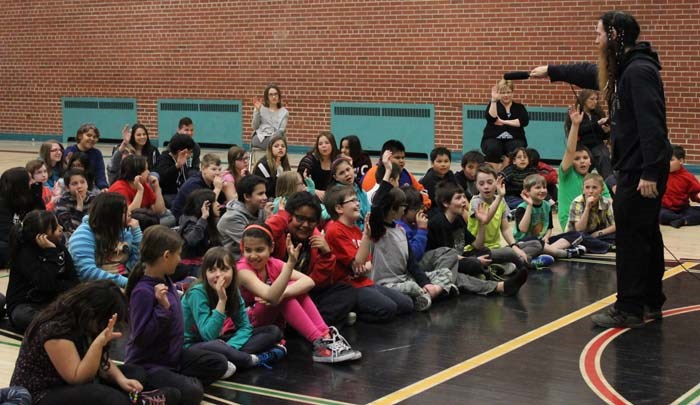A very special guest delivered a very important message to students at YorktonтАЩs Dr. Brass School last Wednesday, April 22.
Canadian WrestlingтАЩs Elite (CWE) and National Wrestling Alliance (NWA) star Jason тАШThe GiftтАЩ Kincaid, known for both his physicality and energy in the ring as well as his outrageous look, took time out of his busy schedule to address the Dr. Brass students about the proper way to be a hero.
Contrary to popular belief, being a hero isnтАЩt about defeating the evildoers with physicality and force. According to Kincaid, the real way someone becomes a hero is through courage, compassion, understanding and character. All things he says he learnt over the course of a few days when he was a child.
In fact, Kincaid told the Dr. Brass students the exact story that changed his mind about what actually makes a hero.
The story was from his childhood growing up in West Virginia, and he started by telling everyone in attendance that one day a bully at his school was making fun of someone so he decided to take a stand. тАЬThis one kid was bullying another one at school one day,тАЭ Kincaid told the students at Dr. Brass. тАЬSo I decided IтАЩd become the hero and I made a joke about his mom and everyone laughed.
тАЬI felt like a hero.тАЭ
Kincaid and the bully then got into a fist fight because of what he had said about the bullyтАЩs mother; a fist fight Kincaid said he won. тАЬI hit him and he went down and I felt great,тАЭ a smiling Kincaid told the Dr. Brass students, who listened intently as they enjoyed the story. тАЬBut then I had to go to the principalтАЩs office for fighting and when I got there I saw the bully and again I felt great.тАЭ
But then Kincaid said that great feeling began to fade away. That pride that he had once felt in being the hero at school quickly turned to shame when he found out that it was he that had went from hero to bully with his comment about the bullyтАЩs mother.
Because he found out that what he had said wasnтАЩt just a joke. It wasnтАЩt just a cleverly delivered line that silenced the bully and freed everyone else from his reign of terror.
Instead it was a verbal knife deep into the heart of a fellow classmate. тАЬI found out what actually caused the fight was me talking about his mother who was dead,тАЭ said Kincaid, no longer smiling. тАЬI made fun of his dead mom and I realized I was the bully now.тАЭ
The Dr. Brass students also stopped smiling. The cheers they let loose after listening to Kincaid talk of the fight were long forgotten in the sudden silence that filled the gymnasium.
However Kincaid quickly found a way to bring the smiles back to the faces of the students.
After all, his story wasnтАЩt done yet. тАЬLater I saw him (the bully) at school and I went to apologize,тАЭ said Kincaid, continuing, тАЬBut he was still mad and he knocked me to the ground.
тАЬI got back up, apologized again. I told him I was sorry and that I didnтАЩt mean it. I didnтАЩt know his mom was dead. I apologized again. I decided that instead of hitting him back IтАЩd use compassion and show my character to become the hero. I felt terrible about what I did and eventually he understood.тАЭ
Kincaid said that after a few tense moments the former bully calmed down and actually accepted his apology. Kincaid then decided to talk to his former nemesis and really get to know him instead of simply assuming he was a bully. He found out that the boy he once despised had a hard life at home and that he missed his mother very much.
Kincaid also found out that, after talking to the bully and getting to know him, the great feeling he had when he thought he was a hero began to return.
The more he spoke with the bully, the more compassion and understanding he showed, the more that incredible feeling began to return.
And after putting aside their differences and talking instead of fighting, Kincaid and his former enemy became friends.
In fact they became best friends. And Kincaid once again became a hero.
Following KincaidтАЩs presentation to the Dr. Brass students, Dr. Brass vice-principal Ron Gillis said that KincaidтАЩs message was a strong one and that it seemed to connect with at least a few of the students that were listening. тАЬEvery time you can get someone in who is in a marquee position to give a positive message to the kids itтАЩs a good thing,тАЭ said Gillis, continuing, тАЬhe did a great job bringing them along with him and I think his message of being a hero with compassion and understanding instead of violence really made an impact on some of the kids.тАЭ
Kincaid, too, thought that the Dr. Brass students really took his message to heart. тАЬI thought the kids were very attentive and I think they were really listening to everything I was saying,тАЭ said Kincaid, his smile once again shining above his beard. тАЬI think that theyтАЩll all try to be heroes the right way now, instead of turning to violence.тАЭ




